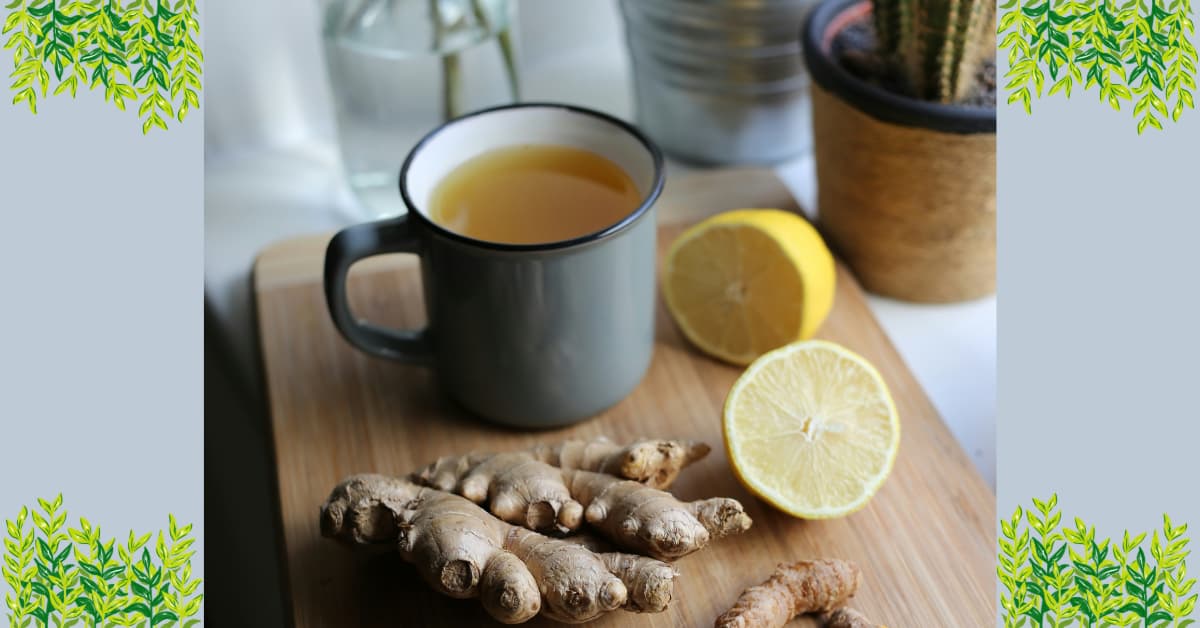Table of Contents
Introduction
Ginger tea is a globally popular and traditional herbal drink made from the rhizome of the ginger plant, Zingiber officinale. It is cherished for its warm, spicy flavor, delightful aroma, and long history of use in traditional medication in Asia and other parts of the world.
However, many people who love ginger in other forms or types have never had a cup of ginger root tea. Ginger tea and any herbal tea, like peppermint tea, have several health advantages.
If you’re looking for a relaxing, warm drink with health advantages and a strong taste, ginger tea may be for you. It’s a favorite among herbal tea drinkers; people have been drinking ginger tea for hundreds, if not thousands, of years.
At its simplest, ginger tea is a herbal infusion created by steeping fresh, sliced, crushed, or grated ginger root in boiling water. Technically, it is often not a “tea” because it may not contain any leaves from the Camellia sinensis (tea) plant, making it a naturally caffeine-free herbal tisane. However, in many regional variations, ginger is brewed alongside black tea leaves, milk, and spices, as with Adrak ki Chai (Indian ginger tea) or Teh Halia (Southeast Asian ginger milk tea).
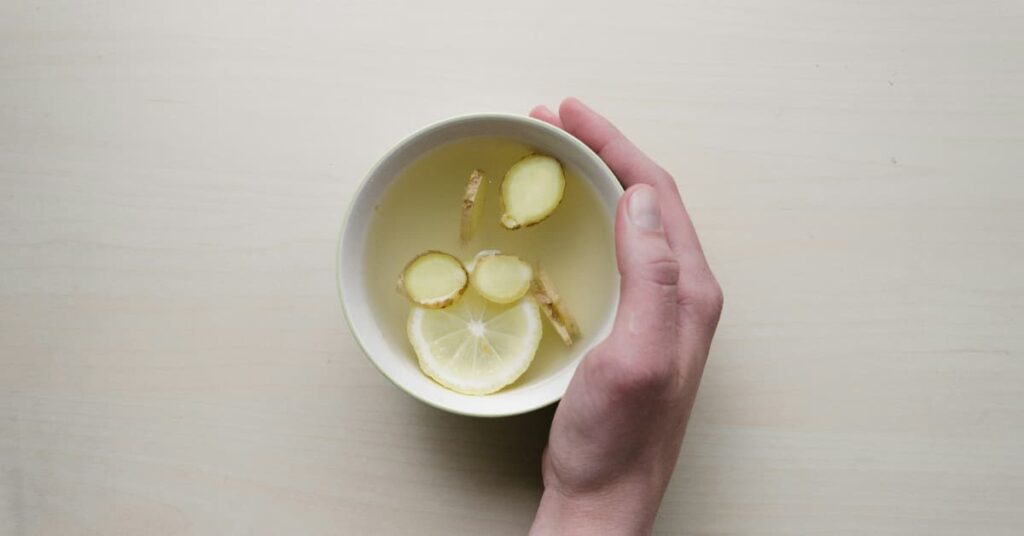
Ginger Tea
Many people in different countries consider ginger a healthy food. Ancient texts or works from China, India, and the Middle East indicate ginger’s medicinal or remedial qualities. Although research supports its use for several conditions, scientists need more research to understand precisely how it works.
Ginger root is easily available in supermarkets. Under its pale brown skin, it’s fibrous & usually cream or brown -colored. You may make ginger root tea by peeling the root or slicing or chopping it. Place the root in a water pot, boil for up to 12 minutes, and then let it stand before drinking. Many people like to add other herbal ingredients, for example, turmeric, pepper, cinnamon, mint, or lemon. It is a member or organ of the same plant family as turmeric and cardamom.
In medieval times, the spice trade brought ginger to Europe, which was also used in candies.
Since then, ginger has been used as a flavoring in numerous forms, including fresh, powdered, pickled, crystallized, dried, and ground.
Ginger tea benefits
1. Relief from chemotherapy-induced nausea
It has a long history of use for calming digestive problems. Several investigations have looked at whether it may ease nausea & vomiting resulting from cancer chemotherapy. One meta-analysis of 10 investigations reported positive results. Two other researches found ginger effective when used with anti-nausea medications.
2. Relief from pregnancy-related nausea
Other investigations have centered on the use of ginger for nausea & vomiting related to pregnancy. An analysis of these investigations found that ginger was superior to a placebo for relieving nausea. Nevertheless, ginger did not significantly decrease the number of vomiting episodes. The investigations found no dangers related to using ginger during pregnancy.
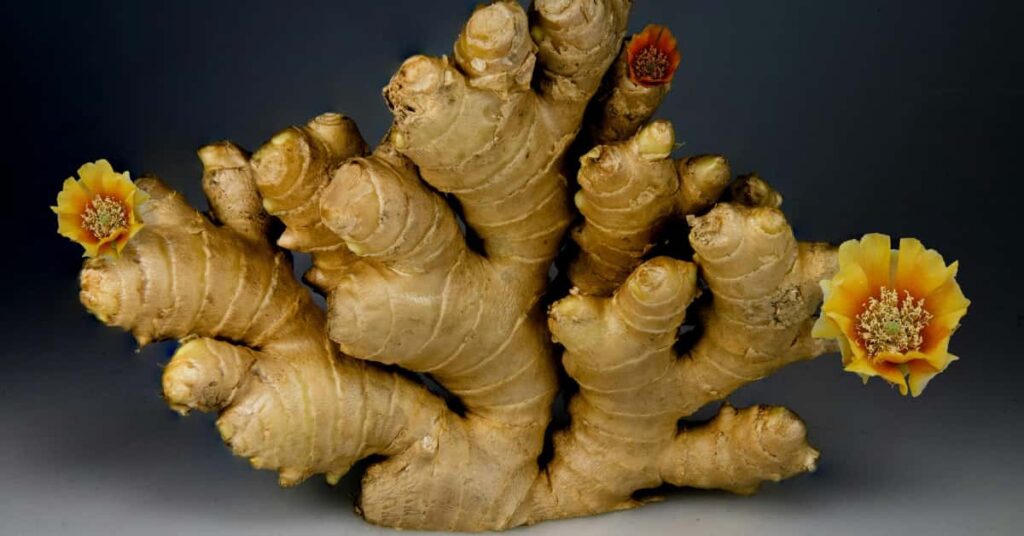
3. Anti-inflammatory effects
- Gingerol and the other anti-oxidants in ginger root may decrease inflammation in your body. It acts similarly to nonsteroidal anti-inflammatory drugs, like ibuprofen(a synthetic compound used widely as an analgesic and anti-inflammatory drug). In one analysis of patients with knee osteoarthritis, ginger reduced pain on standing. The result was moderate.
4. May assist in managing blood pressure and supporting heart health
Investigation indicates that consuming 2–6 grams of ginger daily may assist in protecting against heart issues.
Ginger may do this by:
- lowering blood pressure
- relieving heartburn
- lowering cholesterol
- helping prevent heart attacks
- helping prevent blood clots
- improving blood circulation
5. Relief from nausea
Since ancient times, individuals have used ginger to treat gastrointestinal (stomach-related) complaints, including indigestion, vomiting, and nausea. Clinical analysis shows that ginger in its so many forms, counting lemon ginger tea, is a successful treatment for nausea & vomiting—even those resulting from pregnancy and chemotherapy.
6. Weight loss
It may also assist you lose weight. Lemon has been shown to decrease insulin resistance & the amount of fat stored in the body. Ginger has been shown to decrease hunger, which can help people lose weight.
7. Improved immunity
Ginger has immunity-boosting properties and may guard against some bacteria.
8. Protection from some cancers
Ginger is believed to lower the risk of some cancers.
9. Reduced risk of cardiovascular and liver disease
Ginger contains elements that are believed to assist in decreasing risks associated with cardiovascular disease and liver disease.
10. Pain relief
It can help lower pain associated with arthritis, inflammation, and even headaches. Many people drink ginger tea to relieve muscle soreness after a workout or menstrual pain.
11. May protect the brain
Scientists have calculated ginger’s protective impact against oxidative stress & inflammation, two factors that play a decisive role in developing brain degenerative diseases, such as Alzheimer’s.
12. May help manage blood sugar levels
Much research shows that consuming ginger benefits weight and blood sugar management.
Ginger may assist in improving blood sugar control in individuals with type 2 diabetes & overweight (obesity) by lowering fasting insulin levels, hemoglobin A1C, and triglycerides. Hemoglobin A1C indicates blood sugar levels over the past 2–3 months.
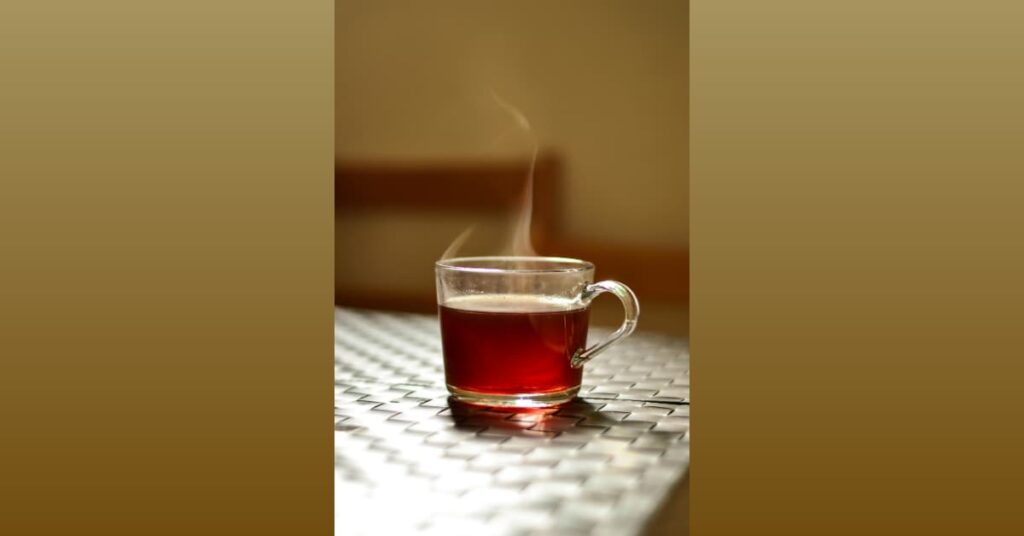
Ginger tea ingredients
Ingredients
- Four to six thin pieces of peeled, raw ginger (for stronger ginger tea, & more slices)
- 2 cups (approx 473 mL) water
- juice(optional) from a lime or lemon
- honey or another sweetener, to taste (optional)
How to prepare ginger tea at home (ginger tea recipe)
Here is an easy recipe for making own ginger tea.
Directions to make it with water
You may find ginger tea at many grocery stores. Most often, you may prepare it from tea bags and tea mixes. Nevertheless, if you’d like to get the maximum benefit and flavor, you may prepare lemon ginger tea using the fresh component and the method mentioned below.
Ingredients:
- 1-inch length of fresh ginger
- 1 lemon (optional)
- 4 cups boiling water
Method:
- Slice a 1-inch-long fresh ginger as finely as you can. Alternatively, you can also grate the ginger.
- Add the ginger to boiling water. Allow it to cook for 20 minutes.
- Slice one lemon (optional) into fine slices or pieces. Reserve a few lemon(optional) slices to use as a garnish.
Strain & drink this tea throughout the day. Decorate each cup with one of the reserved lemon slices.
Directions to make it with milk
You may also make ginger tea with milk:
- Boil ginger root slices in 1 cup, approximately 237 mL of water for 12 minutes.
- Take off the heat & add 2 cups (473 mL) of milk.
- Put the pot back on the stove and gently simmer the milk and ginger for 5 minutes.
- Serve in your favorite mugs.
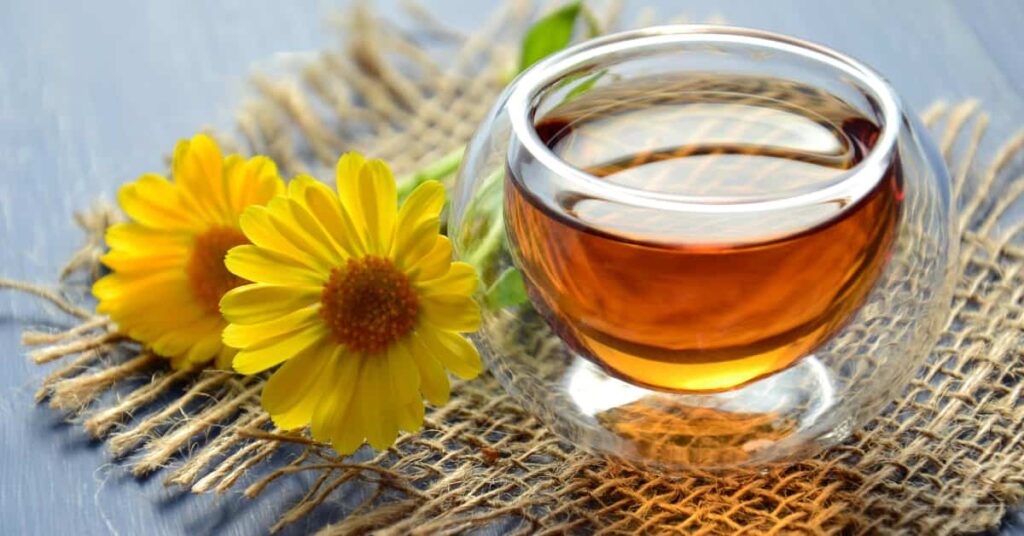
Side Effects of Ginger Tea
The FDA recognizes both lemon and ginger as “generally safe.” Moreover, ginger may cause blood thinning, so you should check with the doctor to see if you use medicine like warfarin and other blood thinners.
1. Gastrointestinal symptoms
Although ginger may soothe some digestive issues, it may cause issues in susceptible individuals. Most reports are of bloating and indigestion.
2. Pregnancy concerns
Those who are breastfeeding or pregnant should not use herbal medicines without consulting their doctors.
3. Complications with blood thinners
Some experimenters believe ginger could affect how blood thinners work in your body. Blood thinners may be prescription drugs like warfarin or over-the-counter medications like aspirin. If you take any medicines with blood-thinning qualities, consult the doctor before taking ginger root tea. It may also interact with diabetes medication & medications for high blood pressure. It can lower blood sugar and blood pressure, so use caution when taking ginger if you are on any of those medications.
4. Lowered Blood Sugar (Hypoglycemia)
Ginger can help lower blood sugar levels. If a person with diabetes is already taking blood sugar-lowering medications (like insulin or metformin), adding enormous amounts of ginger tea could cause blood sugar to drop dangerously low.
5. Low Blood Pressure (Hypotension)
It may act as a realistic calcium channel blocker, which may lower blood pressure. Someones who already have low blood pressure or are carrying antihypertensive medicine (for high blood pressure) should be careful to bypass dizziness or fainting.
6. Allergic Reactions
Though rare, ginger can cause allergic reactions. Symptoms can include itching, skin rash, swelling, or respiratory discomfort.
7. Gallbladder Issues
Some sources suggest that ginger may increase bile production, which could potentially be harmful to people with gallstones or other gallbladder diseases.
Conclusion
Ginger is one of the most common ingredients worldwide, used as a spice & medicinal plant.
In folk medicine, individuals often use it to treat coughs or the flu, among other ailments.
So, the above are just some of ginger tea’s known and potential benefits.
Ginger tea is a delicious, easy, and all-natural way to encourage good health. In addition to its so many health benefits, it’s easy and simple to prepare at home.
Whether under the weather or craving a warm drink, ginger tea is a great relaxing way. Sit back, breathe in, sip slowly, and enjoy.

